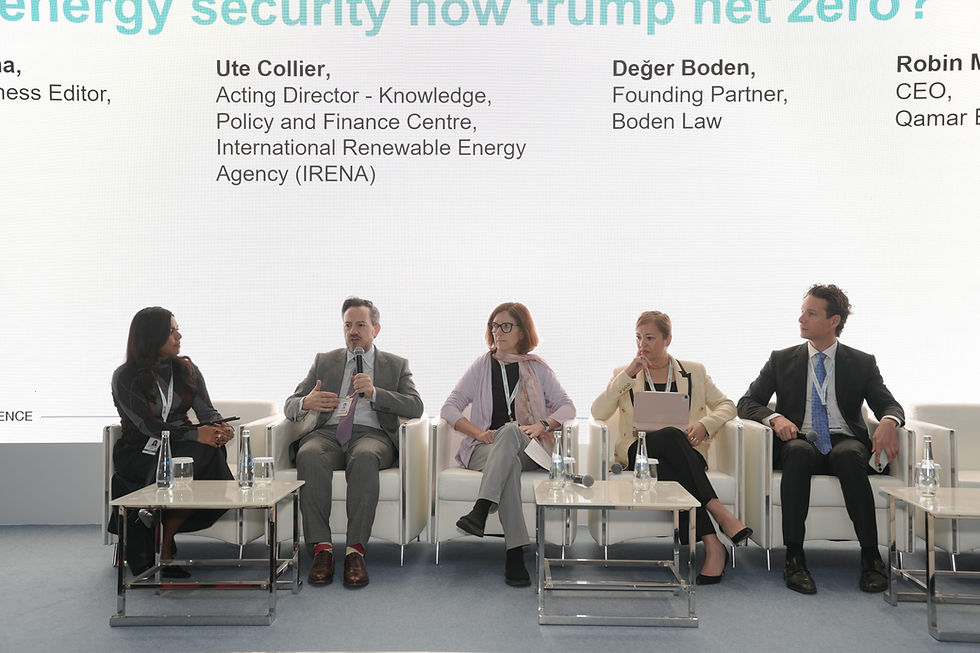Zest in the news: How the UAE and UK can reap multi-billion hydrogen rewards
- Zest Associates

- Oct 17, 2022
- 4 min read

The UK and UAE could create up to 100,000 new jobs each in the hydrogen sector by maximising opportunities for collaboration, which may also include a joint investment vehicle.
A report by the World Green Economy Organisation (WGEO) and UAE-based sustainability consultancy Zest Associates concludes the two countries can become “influential players in this emerging market”.
The study, which brought together 33 industry leaders from both the UAE and UK, added that deeper and broader collaboration across policy, innovation, investment and business could “unlock mutual benefits for climate and economic development”.
Experts said both countries’ net zero commitments depend on clean hydrogen to deliver emission reductions, especially in hard-to-abate sectors, adding that their abundant renewable energy resources and natural gas endowments will be used to produce green, blue and potentially turquoise hydrogen while their nuclear resources may also produce pink hydrogen.
“Hydrogen offers pathways for greater energy independence in the UK, economic diversification in the UAE, and job creation in both countries,” said report author Jeffrey Beyer, managing director of Zest Associates.
“By 2050, hydrogen is estimated to deliver up to $8.7 billion annually to Dubai’s economy alone, and $15.5bn to the UK, as well as over 100,000 new jobs in each country under high-adoption scenarios.”
He added: “These opportunities are driving multi-billion dollar investments, individually, and jointly through bilateral agreements and memoranda of understanding at government and corporate levels.
“These could be enlarged to match the scale of hydrogen investment required to achieve net zero.”
The report says hydrogen-related investment in the UAE and UK could hit $50bn by 2030, with Abu Dhabi National Oil Company (ADNOC) aiming to become a “hydrogen leader” as part of its investment programme up to 2025.
Other major investments in the UAE include the 2gw $5bn joint green hydrogen investment by Engie and Masdar, the $1bn Khalifa Industrial Zone green ammonia facility in Abu Dhabi, and a 2gw green ammonia facility developed by TAQA and Abu Dhabi Ports.
Meanwhile, the UK aims to unlock $4.8bn of private investment for the production of blue and green hydrogen to promote the development of the UK’s hydrogen economy.
Beyer said a $10bn UAE-UK hydrogen investment fund could mobilise finance into the sector, augmenting the UAE-UK Sovereign Investment Partnership announced in 2021, which will see the UAE invest $12bn over the next five years in energy transition, technology and infrastructure.
This investment relationship in hydrogen is already well underway. In May, ADNOC agreed to take a 25 percent stake in the design stage of BP’s blue hydrogen project, H2Teesside.
Abu Dhabi-based Masdar also signed an MOU to acquire a stake in BP’s green hydrogen project, HyGreen Teesside.
Beyer noted that both countries may also consider building a strategic hydrogen reserve, stocked at market prices and backed by government.
“Cross-disciplinary coordination is also needed to make effective policy, build infrastructure, accelerate innovation, unlock finance and prepare the workforce,” Beyer added.
“There is an appetite from stakeholders in the UAE and UK to deepen cooperation in these domains.”
Clare Jackson, the chief executive of Hydrogen UK, a trade association committed to the development and deployment of hydrogen solutions, also sees strengthening UK-UAE collaboration as both countries look to hydrogen as a key tool for tackling climate change.
“Partnerships between the UK and UAE could be beneficial to the development of hydrogen in both countries, as demonstrated by the recent collaboration in Teesside,” she said.
The report also pointed to innovation in the UAE and UK as being key to the partnership, saying that while the UK excels at early-stage innovation, the UAE excels at later-stage scale-up.
“This complementarity could be exploited through testing and demonstrations of new UK technologies at UAE facilities, potentially linked to UAE corporate venturing to accelerate scale-up and unlock shared financial returns,” it stated.
“For carbon capture and storage, an enabler of blue hydrogen, the UAE’s leading technical capabilities could be further utilised in the UK’s industrial clusters.”
With forecast investment in hydrogen at just 40 percent of global need, the UAE and UK also need to improve the bankability of hydrogen projects to mobilise investment.
Global investment in hydrogen is forecast to reach $500bn by 2030, far short of the $1.2 trillion required to reach long-term net zero goals.
UAE entities like the Emirates Development Bank and the UK’s Infrastructure Bank could act as Green Investment Banks to reduce risks, build technical capability and crowd in private sector finance for this relatively new market, Beyer suggested.
“There is an opportunity to enlarge investment partnerships, including for enabling infrastructure,” he said.
The report comes as the UAE and UK’s Net Zero by 2050 strategies frame their approaches to transitioning to a low carbon economy.
In the intermediate term, the UAE aims to reduce emissions by 23.5 percent by 2030 relative to 2016 business-as-usual forecasts, and the UK aims for a 68 percent reduction by 2030 compared to 1990 levels, and a 78 percent reduction by 2035.
For the UAE, hydrogen represents an opportunity to diversify away from fossil fuel export earnings which comprise 30 percent of the country’s GDP.
For the UK, primarily a net energy importer, hydrogen can become a means to improve energy security and long-term energy system resilience.
At least 17 countries and the EU have already developed hydrogen strategies including the UK.
About 20 other countries are presently formulating their policies with several expecting to publish this year. In the Middle East, this includes the UAE, Saudi Arabia, Oman and Israel.


Comments